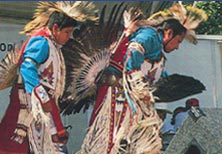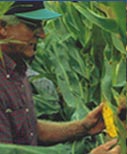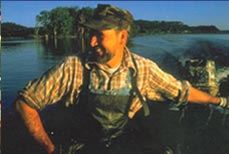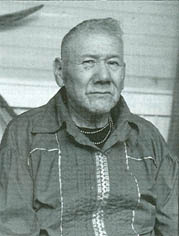






| Resources | ||||||
|
||||||
| Learning Guide |
| 1. Social Studies |
| 2. Language Arts |
| 3. Music |
| 4. Art |
| 5. Special: Multi-Disciplinary, Culminating Activities |
|
Everett Kapayou: vocals and hand drum Indigenous peoples have been living in the region that became the state of Iowa for at least 12,000 years. As many as fifteen different tribes are known to have inhabited Iowa, and the name of the state itself comes from the Ioway people, an agricultural society. Today Iowa's most prominent group of American Indians are the Meskwaki—or "Red Earth People." The Meskwaki are historically related to the Algonquin-speaking tribes of the Great Lakes region and they have been known by many names, including the Renards, the Outagamies, the Fox, and the Sac. The Meskwaki arrived in Iowa shortly before widespread Anglo settlement. Unable to defend their territory, they were forced onto reservations in Kansas . But in 1850 they returned to the state and purchased land in the Tama area, where they established a community that has become known as the Meskwaki Indian Settlement. The Meskwaki have perpetuated their cultural traditions through numerous community events including the annual Meskwaki Powwow, established in 1913. Many Meskwaki have become active in the Pan-Indian movement, and their drumming groups, dancers, and singers have performed at dances and ceremonies throughout the country. The music of Everett Kapayou is an important contribution to these events, and to the local population. Everett Kapayou is from the Meskwaki Indian Settlement in Tama. He is known and widely respected for his repertoire of Meskwaki love songs —which are also known as "mood songs." Everett also sings songs from the Pan-Indian movement including dance songs, war dance songs, and round dance songs. He sings some of his tunes in English, thereby allowing younger Meskwakis and other members of his audiences to understand the lyrics. Everett is also known for telling stories and jokes at different performances. In 1993, Everett Kapayou was honored with a National Heritage Fellowship Award from the National Endowment for the Arts in recognition of his significant contribution to preserving and perpetuating Meskwaki traditional culture.His two selections feature vocables, or non-lexical musical syllables. This style of singing is characteristic of the music of the northern plains, as is his use of a descending terraced melody. The glissando that he uses to conclude his songs is common within many American Indians' singing traditions; it signifies that the tune is completed by providing a rhythmic pulsation that punctuates the melody. |
Previous |
| | Next |
| smithsonian institution |
 |
pioneer hi-bred international, inc. |
iowa sesquicentennial commission |
 |
iowa arts council |
